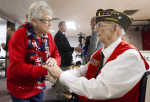Merle Hicks receives seven medals including Bronze Star

Editor's note: During Hicks time in El Dorado Springs, he spent several years working at the Nevada State Hospital.
By Kate Prengaman
Courtesy Yakima Herald-Republic
Back in February 1945, Yakima, Wash., resident Muriel "Merle" Hicks, a resident of El Dorado Springs from the 1970s until 2010, spent three days hiding in a hole outside of the German city of Duren, while hundreds of German soldiers set up position in trenches around him.
The third night, American planes began bombing the city and Hicks decided to make a break for it. He put on his long raincoat, which looked similar to the German soldiers' coats, and crawled out of his hiding spot as dusk descended and walked right past the enemy soldiers eating dinner.
"He just nonchalantly walked down the trench line," his grandson, Brent Woodcock, said. "When he got back to his base, he was just two hours away from being declared missing in action."
Woodcock said he grew up hearing this story and many others about his grandfather's experience on the front lines of World War II. Hicks, who turned 92 last week, served as an Army second lieutenant from 1941 until 1945. He fought in Belgium, Holland and Germany, before returning home to St. Louis to marry and raise five children.
"Basically, what I learned about World War II was from Grandpa," Woodcock said. "His stories made it real."
Recently, Hicks' family and friends gathered to celebrate his military service at the Veterans of Foreign Wars Post in Yakima, when U.S. Rep. Doc Hastings presented Hicks with a long overdue Bronze Star, the fourth-highest military award for individual bravery or heroism, along with six other medals.
"Even though it's somewhat late, from 1945, better late than never," Hastings said as he gave Hicks the medal.
Hicks earned the Bronze Star a few months before he slipped past those unsuspecting German soldiers -- for protecting his company by taking out a enemy machine gun position in December 1944 in Holland.
His commander asked him to try to take out the German machine gun, but the target was too close for him to use his rocket launcher, or bazooka as it was often called. He quickly decided to jury-rig the weapon and position the barrel between his knees.
Hicks' already quiet voice gets quieter when he remembers what happened next. After a long pause, he said his aim was true and the mortar he fired took out the machine gun and killed both gunners.
"I never took another man's life again, and I hope I never have to," Hicks told the crowd.
His commander told him he wanted to recommend him for the Bronze Star that night, but the commander was killed the next day. Hicks fought on with his company until he was wounded by shrapnel near the very end of the war. He was one of only six original members of his company to survive the war. Companies are typically composed of 100 to 200 soldiers.
After he returned home to Missouri, Hicks worked as a manufacturing supervisor and raised his family. In 2010, he moved to Yakima to be closer to his son. His daughter, Kathy Ricker, said although she grew up hearing his war stories, she didn't really appreciate all that he had been through until more recently.
Her brother agreed.
"He's always been a storyteller, but when we were young the details weren't always filled in," Bryan Hicks said. "Now, I know they just scratched the surface of what he experienced."
It was Hicks' stories that made the family wonder if perhaps he had earned recognition for his bravery that he never received. Their investigation stalled when they discovered that military records in St. Louis had been destroyed in a 1973 fire, but they didn't give up.
"With Grandpa getting older, I thought, we've got to get on this," Woodcock said. "Last summer I emailed Congressman Hastings' office and immediately got a response."
Within a few months, Hastings' aides had tracked down records indicating that Hicks had earned the Bronze Star, but that it had never been issued.
Hicks said it felt "darn good" to receive the honor after all these years and that it was "quite a privilege" that so many gathered to celebrate with him.
Hastings also presented Hicks with the Combat Infantryman Badge 1st Award, the Expert Infantryman Badge, the American Defense Service Medal, the European-African-Middle Eastern Campaign, the World War II Victory Medal and the Honorable Service Lapel Button during World War II.
Hicks modestly brushed off his family's praise of his service and his storytelling. All the soldiers he fought with who came home, brought stories like his with them, he explained.
"Oh, everybody has stories, I'm not the only one," Hicks said.
But, he might be one of the only ones to receive his medals almost 70 years, and lots of life stories, later.
